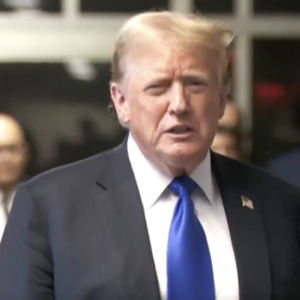For an alternate view, see “Point: Trump Verdict Makes NYC ‘Venezuela-on-the-Hudson’”
Former President Donald Trump is now a convicted felon. This is the first time in U.S. history that a sitting or former president has been found guilty of committing a crime. It’s a sobering milestone but a victory for accountability and the fundamental principle that in our democracy, no one is above the law, not even its highest elected leader.
After a six-week trial in Manhattan, where Trump’s corporation is headquartered, a jury of 12 everyday Americans unanimously convicted Trump of all 34 felony counts of illegally falsifying business records to cover up a sex scandal – the central part of a scheme to hide crucial information from voters weeks before the 2016 presidential election.
The jury heard from 22 witnesses, many of them Trump’s close former aides and confidants, and considered over 200 exhibits. They fairly applied the same standard to the former president as they would apply to anyone else. They did so despite the efforts by Trump and his allies to disparage and intimidate them, the judge, the judge’s family, the prosecutor, and several witnesses. Those dangerous attacks caused the judge to rule that Trump violated a gag order 10 times, although the judge did not impose jail time.
Trump, who steadfastly maintained his innocence and will appeal the verdict, was able to present his defense. He chose not to testify, even though he claimed that the prosecution was “rigged” against him. On July 11, the judge will sentence him.
But this criminal prosecution was about so much more than just hush money payments or falsifying business records, the latter charge being commonly prosecuted in New York. This was about Trump’s repeated efforts to subvert our nation’s democracy, as one of the prosecuting attorneys stated in closing argument. It is yet another example of Trump’s pattern of breaking rules to gain and maintain power, which has included asking Russia for help to win the 2016 election and masterminding the plot to overturn the 2020 election, which resulted in the violent Jan. 6 insurrection at the U.S. Capitol.
As the presumptive Republican nominee for the 2024 presidential election, Trump remains a dangerous threat to democracy. He is already trying to undermine the jury’s verdict, casting aspersions on the justice system, and vowing retribution against his political enemies. His rhetoric has grown increasingly authoritarian as he shatters political norms. Trump’s allies have prepared a massive governing blueprint – Project 2025 – which would gut our government’s system of checks and balances to place almost all power in the president, making it possible for the first time to carry out radical policies without barriers.
Trump also faces criminal charges in three ongoing prosecutions, and the legal system must move swiftly to pursue justice there. One federal case and a Georgia case involve his alleged plot to overturn the 2020 election. A third case involves his alleged illegal retention of highly sensitive classified documents. Trump has used a wide range of tools to delay trials in those cases, including arguing before the U.S. Supreme Court that presidents have total immunity from being prosecuted for crimes they may have committed while in office, like ordering the assassination of political opponents. It is lamentable that extremist justices are even considering this anti-democracy immunity argument.
In the meantime, the verdict in the Manhattan case is a testament to how justice can be served in our system. It’s a reminder that day in and day out, across our nation, juries of “we the people” hold offenders accountable and help protect our freedoms, our free and fair elections, and the future of democracy. And here, the jury upheld one of the most important tenets undergirding our system: The laws and Constitution apply equally to everyone, even a former president. It will be crucial to defend the jury’s brave work, as there’s a strong likelihood that Trump’s relentless attacks on the jurors – along with the judge, prosecutor and witnesses – will continue, placing their safety in jeopardy.
Aside from legal accountability, time will soon reveal the political ramifications of Trump’s convictions. Surely many Americans, regardless of their political affiliation, will have deep reservations voting for a candidate convicted of multiple felonies aimed at subverting a free and fair election. With the November presidential election five short months away, Americans must choose a pro-democracy path that strengthens our bonds and builds hope that our best days are ahead of us.


